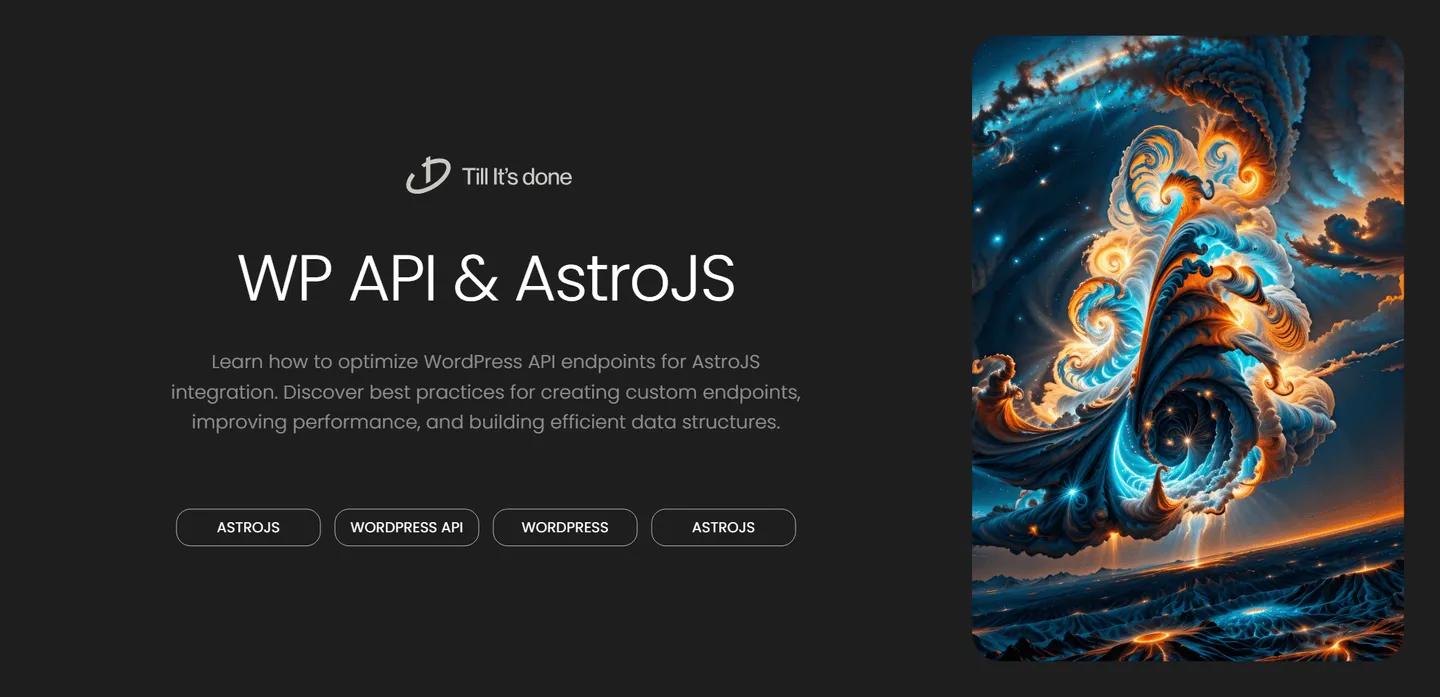- Services
- Case Studies
- Technologies
- NextJs development
- Flutter development
- NodeJs development
- ReactJs development
- About
- Contact
- Tools
- Blogs
- FAQ
Customize WordPress API Endpoints for AstroJS
Discover best practices for creating custom endpoints, improving performance, and building efficient data structures.


One of the most exciting developments in modern web development is the marriage of traditional Content Management Systems with cutting-edge frontend frameworks. Today, let’s explore how to supercharge your AstroJS website by customizing WordPress API endpoints for optimal performance and functionality.
When I first started working with AstroJS and WordPress, I quickly realized that the default REST API endpoints weren’t quite cutting it for my specific needs. The standard endpoints often return more data than necessary, which can impact loading times and overall performance. Let’s dive into how we can streamline this integration.

Understanding the Basics
The WordPress REST API is incredibly flexible, but out of the box, it might not align perfectly with your AstroJS project’s requirements. By customizing these endpoints, we can:
- Reduce unnecessary data transfer
- Format data specifically for our frontend needs
- Improve application performance
- Create more maintainable code
Creating Custom Endpoints
The first step is registering a custom endpoint in your WordPress installation. You’ll want to add this code to your theme’s functions.php file or, better yet, in a custom plugin:
add_action('rest_api_init', function () { register_rest_route('myapp/v1', '/featured-posts', array( 'methods' => 'GET', 'callback' => 'get_featured_posts', 'permission_callback' => '__return_true' ));});Optimizing Data Structure
When crafting your response, think about exactly what your AstroJS components need. This approach has dramatically improved my projects’ performance:
function get_featured_posts() { $posts = get_posts(array( 'posts_per_page' => 5, 'post_status' => 'publish' ));
$formatted_posts = array_map(function($post) { return array( 'id' => $post->ID, 'title' => $post->post_title, 'excerpt' => get_the_excerpt($post), 'featured_image' => get_featured_image_url($post->ID) ); }, $posts);
return rest_ensure_response($formatted_posts);}
Consuming Custom Endpoints in AstroJS
In your AstroJS components, you can now fetch this optimized data efficiently. Here’s how I structure my data fetching:
const response = await fetch('https://yoursite.com/wp-json/myapp/v1/featured-posts');const posts = await response.json();Remember to handle errors appropriately and implement caching strategies where possible. I’ve found that implementing proper error boundaries and loading states makes the user experience much smoother.
Best Practices and Tips
Through my experience, I’ve discovered these key practices for maintaining a robust WordPress-AstroJS integration:
- Always version your API endpoints
- Implement proper caching mechanisms
- Use WordPress transients for complex queries
- Consider implementing authentication for sensitive data
- Keep your endpoint responses lean and focused

By following these guidelines and customizing your WordPress API endpoints, you’ll create a more efficient and maintainable integration between WordPress and AstroJS. The result? A blazing-fast website that’s a joy to develop and maintain.
 Web Developers คืออะไร? สำคัญแค่ไหน Web Developer คืออาชีพที่มีทักษะด้านโปรแกรมมิ่ง และมีการเรียนรู้ในเทคโนโลยีใหม่ ๆ เพื่อพัฒนางานอย่างต่อเนื่อง และมีความสำคัญกับธุรกิจในยุคดิจิตัลแบบนี้เป็นอย่างมาก
Web Developers คืออะไร? สำคัญแค่ไหน Web Developer คืออาชีพที่มีทักษะด้านโปรแกรมมิ่ง และมีการเรียนรู้ในเทคโนโลยีใหม่ ๆ เพื่อพัฒนางานอย่างต่อเนื่อง และมีความสำคัญกับธุรกิจในยุคดิจิตัลแบบนี้เป็นอย่างมาก  จุดเด่นของ React JS คือ ดียังไงกับการทำ Mobile App React JS เป็นไลบรารีที่สนับสนุนการพัฒนาแอปพลิเคชันแบบ Single Page พร้อมรองรับการสร้างแอปบนมือถือด้วย React Native แต่ทำอย่างไร มาดูกันครับ
จุดเด่นของ React JS คือ ดียังไงกับการทำ Mobile App React JS เป็นไลบรารีที่สนับสนุนการพัฒนาแอปพลิเคชันแบบ Single Page พร้อมรองรับการสร้างแอปบนมือถือด้วย React Native แต่ทำอย่างไร มาดูกันครับ  Flutter คืออะไร ฟรีมั้ย การพัฒนาแอปพลิเคชันในยุคดิจิทัลนี้ Flutter ได้กลายเป็นหนึ่งในเครื่องมือที่ได้รับความนิยมอย่างมากในวงการ แล้ว Flutter คืออะไร แล้วใช้งานฟรีหรือไม่?
Flutter คืออะไร ฟรีมั้ย การพัฒนาแอปพลิเคชันในยุคดิจิทัลนี้ Flutter ได้กลายเป็นหนึ่งในเครื่องมือที่ได้รับความนิยมอย่างมากในวงการ แล้ว Flutter คืออะไร แล้วใช้งานฟรีหรือไม่?  อยากสร้าง Mobile App จะเลือกใช้โปรแกรมเขียน Mobile App การเลือกโปรแกรมเขียน Mobile App มีเครื่องมือกับภาษาอะไรให้เลือกใช้งานกันมากมาย ควรพิจารณาอย่างไรเพื่อให้มีประสิทธิภาพและตรงตามความต้องการของโปรเจกต์
อยากสร้าง Mobile App จะเลือกใช้โปรแกรมเขียน Mobile App การเลือกโปรแกรมเขียน Mobile App มีเครื่องมือกับภาษาอะไรให้เลือกใช้งานกันมากมาย ควรพิจารณาอย่างไรเพื่อให้มีประสิทธิภาพและตรงตามความต้องการของโปรเจกต์  Next.js คืออะไร? มาเริ่มเขียนเว็บด้วย Next.js กันดีกว่า Next.js เป็น Framework สำหรับสร้างเว็บไซต์ด้วย React ที่ช่วยให้สามารถสร้างเว็บไซต์ที่มีประสิทธิภาพและใช้งานได้จริง และรองรับ SEO ได้ดีขึ้นอีกด้วย
Next.js คืออะไร? มาเริ่มเขียนเว็บด้วย Next.js กันดีกว่า Next.js เป็น Framework สำหรับสร้างเว็บไซต์ด้วย React ที่ช่วยให้สามารถสร้างเว็บไซต์ที่มีประสิทธิภาพและใช้งานได้จริง และรองรับ SEO ได้ดีขึ้นอีกด้วย  รู้จักกับ บริษัท Software House คืออะไร ทำอะไรบ้าง Software House คือศูนย์บริการที่ครบวงจรในการพัฒนาเทคโนโลยี ช่วยสนับสนุนธุรกิจในยุค 4.0 และสร้างโอกาสใหม่ ๆ ในตลาดการแข่งขันที่มีการเปลี่ยนแปลงอย่างรวดเร็ว
รู้จักกับ บริษัท Software House คืออะไร ทำอะไรบ้าง Software House คือศูนย์บริการที่ครบวงจรในการพัฒนาเทคโนโลยี ช่วยสนับสนุนธุรกิจในยุค 4.0 และสร้างโอกาสใหม่ ๆ ในตลาดการแข่งขันที่มีการเปลี่ยนแปลงอย่างรวดเร็ว Talk with CEO
We'll be right here with you every step of the way.
We'll be here, prepared to commence this promising collaboration.
Whether you're curious about features, warranties, or shopping policies, we provide comprehensive answers to assist you.


